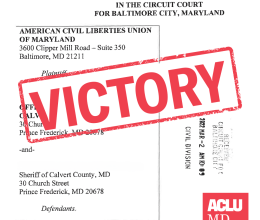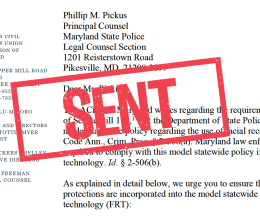
FOR IMMEDIATE RELEASE
July 17, 2013
CONTACT: Josh Bell, national ACLU, 212-549-2666, media@aclu.org
Meredith Curtis, ACLU of Maryland, 410-889-8555, media@aclu-md.org
BALTIMORE - Police departments around the country and around the state are rapidly expanding their use of automatic license plate readers to track the location of American drivers, but few have meaningful rules in place to protect drivers' privacy rights, according to documents released today by the American Civil Liberties Union (ACLU) and American Civil Liberties Union of Maryland (ACLU-MD). As a result, the new documents reveal, many departments are keeping innocent people's location information stored for years or even indefinitely, regardless of whether there is any suspicion of a crime. In Maryland, for every one million plates read, only 47 were potentially associated with serious crimes.
"The spread of these scanners is creating what are, in effect, government location tracking systems recording the movements of many millions of innocent Americans in huge databases," said ACLU Staff Attorney Catherine Crump, the report's lead author. "We don't object to the use of these systems to flag cars that are stolen or belong to fugitives, but these documents show a dire need for rules to make sure that this technology isn't used for unbridled government surveillance."
The systems use cameras mounted on patrol cars or on objects like road signs and bridges, and the documents show that their deployment is increasing rapidly, with significant funding coming from federal grants. They photograph every license plate they encounter, use software to read the number and add a time and location stamp, then record the information in a database. Police are alerted when numbers match "hot lists" containing license numbers of interest, such as stolen cars.
Last summer, ACLU affiliates in 38 states and Washington filed nearly 600 Freedom of Information requests asking federal, state, and local agencies how they use the readers. The 26,000 pages of documents produced by the agencies that responded - about half - include training materials, internal memos, and policy statements. The results and analysis are detailed in an ACLU report released today called "You Are Being Tracked," which includes charts and policy recommendations.
The study found that not only are license plate scanners widely deployed, but few police departments place any substantial restrictions on how they can be used. The approach in the Montgomery County Police Department is typical: a police policy document there says that license plate reader data can be used for any "official law enforcement purposes." While most Maryland police departments do prohibit police officers from using license plate readers for personal uses such as tracking friends, these are the only restrictions. Both Baltimore County and the City of Frederick are unusual in placing some limits on the use of LPRs in connection with expressive activities.
A tiny fraction of the license plate scans are flagged as "hits." For example, in Maryland, MCAC recorded 29 million reads from January through May of 2012, but only 0.2 percent of those license plates, or about 1 in 500, were hits. That is, only 0.2 percent of reads were associated with any crime, wrongdoing, minor registration problem, or even suspicion of a problem. Of the 0.2 percent that were hits, 97 percent were for a suspended or revoked registration or a violation of Maryland's Vehicle Emissions Inspection Program. In other words, for every million plates read and stored in Maryland, only 47 (0.005 percent) were potentially associated with a stolen car or a person wanted for a serious crime.
Yet, the documents show that many police departments are storing - for long periods of time - huge numbers of records on scanned plates that do not return hits. For example, as of November 19, 2012, Prince George's County had over nine million plate reads stored. Baltimore County similarly stored over nine million records over the course of a year. Wicomico County reported having 532,749 scans stored from only three LRP units. Most police departments in Maryland send their data to the Maryland Coordination and Analysis Center (MCAC), Maryland's "fusion center," where they are kept for one year. As a result, in 2012 MCAC stored over 85 million license plate scan records.
"Maryland is leading the way in centralized LPR data aggregation, which makes the privacy implications of this technology all the more pressing," said David Rocah, Senior Staff Attorney for the ACLU of Maryland. "As the number of scanners continues to increase, and as more and more departments acquire the technology and pool their data in Maryland's Fusion Center, law enforcement's ability to paint detailed pictures of every Marylander's movements will grow ever more powerful. We need statutory controls before it's too late to address this issue."
The documents show that policies on how long police keep this data vary widely. Some departments delete records within days or weeks, some keep them for years, while others retain them forever. Most departments in Maryland store data for one year. Montgomery, Anne Arundel, and Wicomico counties store their LPR data indefinitely. In contrast, Takoma Park deletes records after 30 days, and the City of Frederick deletes its data after 90 days. Maine and Arkansas have passed laws prohibiting the police from retaining the license plate location records of innocent drivers for extended periods.
The ACLU report released today has over a dozen specific recommendations for government use of license plate scanner systems, including: police must have reasonable suspicion that a crime has occurred before examining the data; unless there are legitimate reasons to retain records, they should be deleted within days or weeks at most; and, people should be able to find out if their cars' location history is in a law enforcement database.
In Maryland, the ACLU-MD will be advocating for state legislation in the 2014 General Assembly session to sharply limit the amount of time that information acquired from ALPRs can be retained if there is not "hit" generated from a scan.
License plate readers are used not only by police but also by private companies, which themselves make their data available to police with little or no oversight or privacy protections. One of these private databases, run by a company called Vigilant Solutions, holds over 800 million license plate location records and is used by over 2,200 law enforcement agencies, including the Baltimore County Police.
The report, an interactive map with links to the documents, and an interactive slide show are available at: aclu.org/plates
This press release is at: aclu.org/technology-and-liberty/aclu-releases-documents-license-plate-scanners-some-300-police-departments
# # #







